[ad_1]

(GIF source: GIPHY)
Howdy-doody MDL readers! I’m FINALLY back with my second article (got a feeling that this is going to be another long one). Still as excited as ever! 🙂 If you have read my first article, you may realize that most of my GIFs are from historical/ancient dramas. Well, that’s because I really enjoy watching period dramas. So far, I’ve only been watching Korea’s and China’s. You might think, ‘Historical dramas are just a “fight for the throne” plot.’ To me, sometimes that’s the thing that makes historical dramas more romantic. Okay, this is getting lengthy, let’s dive right in!
WHAT MAKES HISTORICAL/ANCIENT DRAMAS MORE ROMANTIC?
It is common knowledge that dramas are romanticised. It’s a fantasy we’d like to be in to get away from reality. Historical dramas are popular because they are set in a time that is far removed from our everyday lives. Because historical times are something we have never experienced in our lives, it is easy for the audience to fantasize.
1. Marriages
(GIF source: GIPHY) The majority of the ancient dramas I’ve watched began with an arranged marriage. There is no bonding because the characters barely know each other or are complete strangers in other circumstances. Although bonding occurs during the dating phase, in their case, dating does not begin until after marriage. Divorces are rarely mentioned in ancient dramas since a man can have several wives but a woman would not desire divorces to escape public judgement. They will simply choose to make the relationship work since they are simple-minded. That’s when all of the romantic moments begin. Spending the rest of their lives with someone they don’t really know and gradually getting to know them will make the heart-fluttering moments that most people have throughout the dating phase more romantic. That’s because there’s no turning back and they’ll always be with each other.  Because modern dramas focus on the dating phase initially, there’s a lot more to be concerned about than just breaking up. It’s bad enough that they have to worry about someone else kidnapping their boyfriends or girlfriends. (GIF source: GIPHY) |
2. Conservative Behaviors
(GIF source: GIPHY) Due to the fact that it is an ancient drama, the characters will be more conservative. To avoid scandals (and to maintain their innocence), ladies are not allowed to mingle with a large number of boys, while men must equally keep their distance from women. Not everyone had the opportunity to study back then. As a result, they lack basic understanding, including human anatomy. As a result, after the protagonists have met their significant other, all skinship moments become their first. This will make the audience feel embarrassed alongside the characters. We can’t deny that it’s cute and lovely, despite the fact that it’s embarrassing. 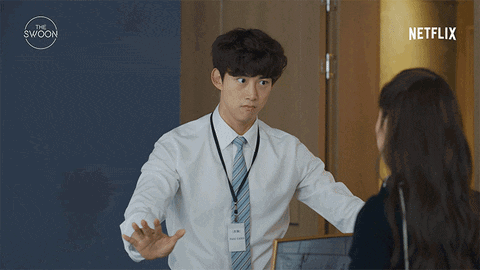 People are more knowledgeable and open-minded in modern times. Skinship has grown increasingly. It is also considered natural to have best pals of the opposite gender. Even if modern dramas have some cute moments, such as individuals becoming shy, they can’t compare to characters who are experiencing something for the first time in their lives and possibly for the rest of their lives. People are more knowledgeable and open-minded in modern times. Skinship has grown increasingly. It is also considered natural to have best pals of the opposite gender. Even if modern dramas have some cute moments, such as individuals becoming shy, they can’t compare to characters who are experiencing something for the first time in their lives and possibly for the rest of their lives.(GIF source: GIPHY) |
3. Second Female Lead is just for show(GIF source: ezgif) This is the one characteristic I’ve seen in nearly every ancient drama I’ve seen. The second female lead serves mostly to demonstrate how devoted the male lead is to the female lead. They are disregarded and, no matter how hard they try, they are never able to win the male lead’s attention. They also fail to attack the female lead, either because the male lead warned them not to or because the female lead is always protected by the male lead. The second female protagonist is always from a better household and is favoured by the male protagonist’s family. It doesn’t matter because male leads are always designed to be a little rebellious (in a pleasant way) and do whatever they want. The male lead’s family, despite their favouritism, can’t help her get the male lead; all they can do is hurt the female lead with words or mind games. 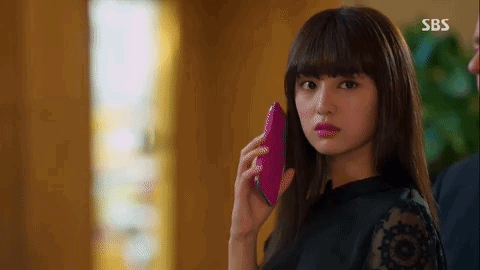 You can dispute with me that modern second female lead is equally unable to capture the interest of the male protagonist. The only difference between modern and ancient is that the modern second female lead can bully the female lead. And anytime the female protagonist is bullied, the male protagonist is just NEVER present. You can dispute with me that modern second female lead is equally unable to capture the interest of the male protagonist. The only difference between modern and ancient is that the modern second female lead can bully the female lead. And anytime the female protagonist is bullied, the male protagonist is just NEVER present.(GIF source: GIPHY) |
4. Stronger Male Lead (GIF source: Tumblr) I’m not sure if it’s just me, but ancient male leads always seemed stronger than modern male leads. As the male protagonist, their character frequently mastered martial arts and had to physically combat their opponents. Alternatively, they must compete using their skills, such as archery or hunting. Essentially, individuals must stand up for themselves when no one else can. Every day, they are on the verge of being assassinated. Because male leads are frequently from royal or aristocratic backgrounds, this is the case. Most male leads in historical dramas are capable of safeguarding their significant others with this. They would hurl their bodies in front of the female lead without hesitation, even if they were on the verge of death. Is there anything more romantic than that? *swoons* Not to mention that the medications back then were not as advanced as they are now, so if they get harmed, the odds of their deaths are higher. |
4. The ‘Comes to the Rescue’ Scenes are better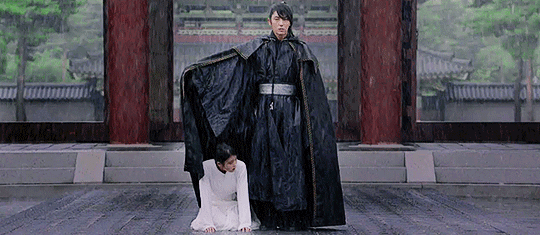 (GIF source: Tumblr) As previously stated, male leads in historical dramas are physically stronger, although their physical skills or strength might be as useless as a chocolate teapot at times. This has to do with the series’ overall backdrop – ancient times — where monarchy reigns supreme. Even though you are the prince of the country, a single word from the monarch will render you impotent as a pauper. All of these factors will cause a male protagonist to rebel, especially if their significant other is injured or abused. They are willing to do what others fear, and will go to any length to keep their significant other by their side, even if it costs death. And, as bringing another person would involve attempting to kill them, this can only be done as a “one-man show.” Because they are physically required to be there, it will make an ancient male lead more romantic when they come to save the female lead. Their sincerity is what touches the audience. 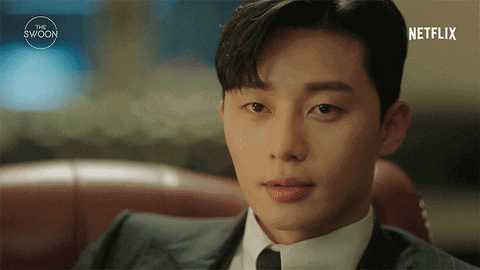 While modern male protagonists aren’t completely useless, they tend to be CEOs. They essentially sit and order people around. Or, if they’re a wealthy individual, the most they can do is make a phone call. Aside from that, there are many resources available to them in modern times, such as police officers, lawyers, and so on. Everything you need is only a phone call away. While modern male protagonists aren’t completely useless, they tend to be CEOs. They essentially sit and order people around. Or, if they’re a wealthy individual, the most they can do is make a phone call. Aside from that, there are many resources available to them in modern times, such as police officers, lawyers, and so on. Everything you need is only a phone call away.(GIF source: GIPHY) |
6. Direct Confession Without Beating Around The Bush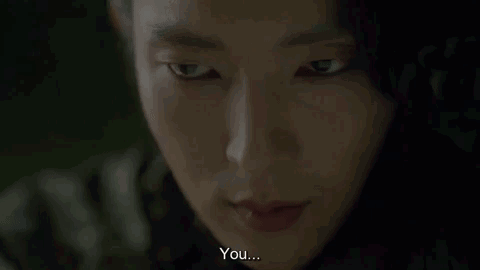 (GIF source: GIPHY) Another thing I’ve seen in ancient dramas is how the male leads openly confess their love. This may have something to do with how simple-minded people used to be. The simplicity of just saying how they feel makes it heart-fluttering. In certain dramas, they will propose marriage immediately after assuring one other that they are feeling the same way. Although the pace is rapid, I doubt the audience will be able to deny that the assuredness of a male lead is giving them butterflies.  (GIF source: GIPHY) Modern male leads do the same thing, except they like to start their sentences with “I think…” or turn them into a question. Despite its cuteness, it leaves the viewer wondering, “Do you like the female lead or not?” (If you try to put yourself in the shoes of the female lead, you’ll understand what I mean) Female protagonists are supposed to be pessimists who believe they do not deserve the male protagonist’s affection. What do you think the female lead will think, aside from a dubious confession? xD |
6. Commitment in Relationships (Undying Love) (GIF source: GIPHY) “If you die, I will never live alone.” This phrase appears frequently in ancient dramas. They will undoubtedly follow in the footsteps of their significant other if he or she passes away. Because a lifetime spent apart from the one they love is pointless and unworthy of living. A lot of people in ancient times believed in fate. As a result, they believe that fate will reunite them after death or in another lifetime. It is the commitment that makes a relationship more passionate. They’d rather die than move on and find new love. (Isn’t this exactly Romeo and Juliet all over again, HAHA.) 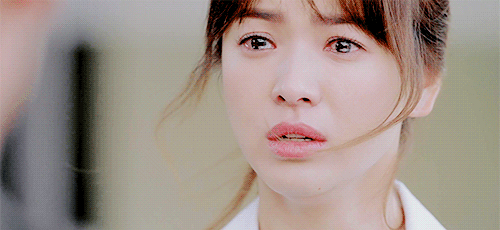 In contrast to modern dramas, when characters learn that their loved ones have died, the most they will do is cry for a few episodes or have a mental breakdown. That’s a smidgeon less romantic. In contrast to modern dramas, when characters learn that their loved ones have died, the most they will do is cry for a few episodes or have a mental breakdown. That’s a smidgeon less romantic.(GIF source: Soompi) |
7. Bittersweet Ending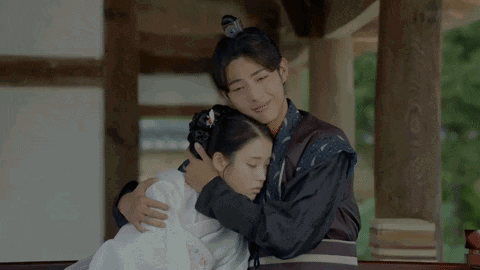 (GIF source: GIPHY) The setting for ancient dramas is what comes into play at this time — monarchy. If the male protagonists do not earn sufficient authority to keep the woman they love by their side, the story would undoubtedly end tragically. Similarly, if a male protagonist gains enough power (such as becoming king), he may not be able to keep the woman he loves by his side. The role of a king is to keep the nation happy and prosperous. In order to do so, they must strengthen their ties by marrying into strong families. Basically, if you’re a noble, your responsibilities take precedence over your relationships. We understood that even if the characters ended up together, they would not be happy, therefore, it is best to leave it as an unforgettable love with them yearning for one other. It’s for this reason that it’s bittersweet. You can’t deny that bittersweet endings linger in your mind longer than happy ones. That’s because you felt it was such a shame that those who truly loved each other couldn’t end up with each other. 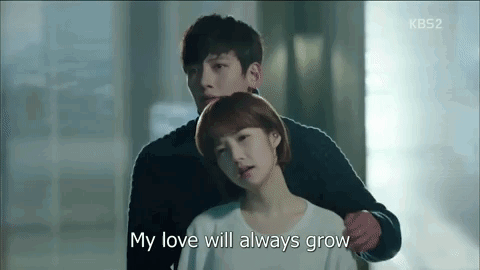 In modern dramas, bittersweet endings are rare. Modern dramas also rarely have a sad ending unless they are explicitly intended to be sad from the beginning. The plot always finds a way to bring the protagonists together. In modern dramas, bittersweet endings are rare. Modern dramas also rarely have a sad ending unless they are explicitly intended to be sad from the beginning. The plot always finds a way to bring the protagonists together.(GIF source: GIPHY) |
8. 虐 (Nüè)
(GIF source: GIPHY) I could not find a word to describe this word in English that has the same meaning as 虐 (Nüè). Generally, it means a sadistic plot. And, to me, this is the most IMPORTANT point about how an ancient drama deceives our minds into thinking it is more romantic than a modern drama. Most ancient drama plots begin happily, but being a protagonist requires being different, and being different was not valued back then. This has to do with how people behaved in those days in terms of ethics and principles. They don’t dare to disagree. People will rather stay wrong than speak up for what is right. Eventually, protagonists will start getting hate from the public where they’re forced to leave their families or loved ones behind or accidentally kill their loved ones. Alternatively, in some cases, families intervene and prevent the protagonist from loving another since national objectives must always take precedence over personal interests. Some protagonists are not born noble, and as a result, they are frequently mistreated or tortured. While some of the plots revolve around characters sacrificing for one another without each other’s knowledge and misunderstanding each other until they are separated. The worst-case scenario is when the protagonist endures all of the anguish throughout the whole plot and continues to say “I’m fine.” A series of tragic events would eventually break a happy-go-lucky protagonist, leaving them broken-hearted. As a result, if the story in the sadistic plot starts handing out candies (romantic cute scenes), audiences are eager to take in and treasure it because it’s like a small reward for us for suffering through the misery alongside the main characters. All romantic scenes in ancient dramas appear to be more romantic in this way. |
EXTRA
- Old Language
For someone like myself who studied Chinese and Korean, I prefer traditional Chinese and Korean. For some inexplicable reason, I find it extra romantic. It’s possible that it had such an impact on me because we don’t use it in our daily lives anymore. xD

This is such a long article but if you managed to stick with me until the end, Thank You So Much! ಥ_ಥ
I hope you guys enjoyed reading it and please let me know what else makes ancient dramas romantic! Since this is about ancient dramas, here I bid you goodbye with a sincere bow.
P.S. I don’t claim to have watched all and know a lot about ancient dramas. I basically wrote down my opinions. If I made any mistakes, please don’t come at me, instead educate me. :’)
Thank You For Reading!
Ellie
Edited by: devitto (1st editor)
historical drama
ancient drama
costume drama
[ad_2]
Source link





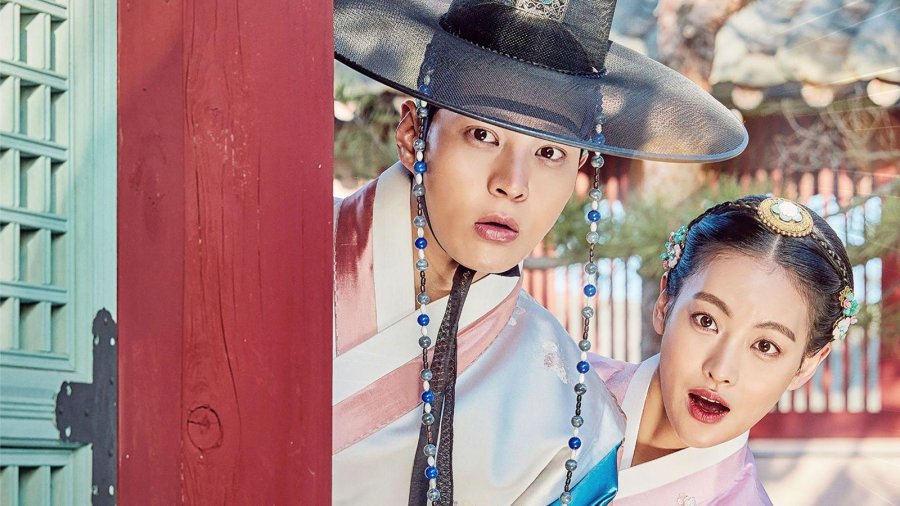
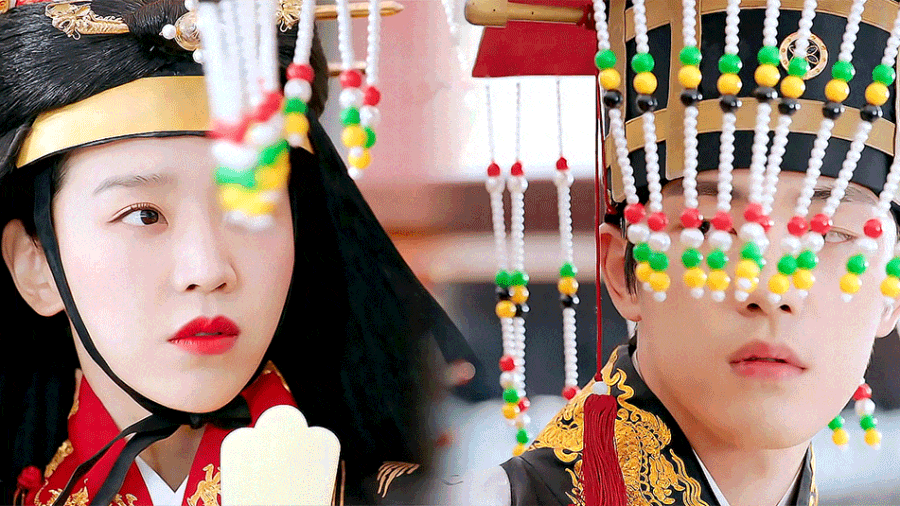
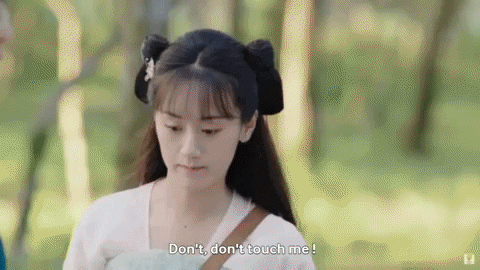

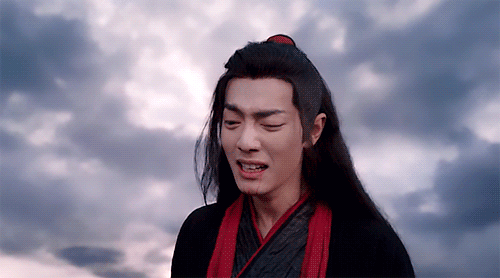



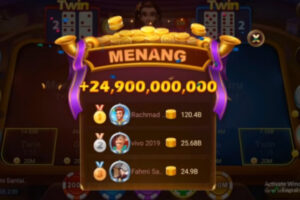
More Stories
Park Hyung Sik and Han So Hee Radiate Chemistry in Cute Promotional Stills for Disney+ K-drama Soundtrack #1
Go Kyung Pyo in discussion to join Park Min Young and Kim Jae Young in a new drama
New Trailer is Out for “Green Mothers Club”